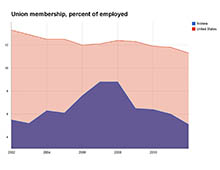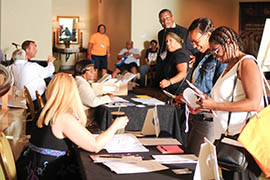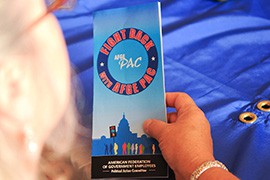Cronkite News has moved to a new home at cronkitenews.azpbs.org. Use this site to search archives from 2011 to May 2015. You can search the new site for current stories.
Union membership in Arizona continues decline, latest numbers show
WASHINGTON – Arizona labor unions have little to celebrate this Labor Day weekend, as membership numbers continue plunge in the state.
Union membership fell from 6 percent of the state’s workers in 2011 to 5.1 percent in 2012, according to the latest numbers from the Bureau of Labor Statistics. That 16 percent drop – from 149,000 to 125,000 workers – was one of the steepest in the nation.
It continues a five-year trend of shrinking union membership in Arizona after a surge in the first decade of the century. Arizona union membership grew from 121,000 in 2002 to a peak of 230,000 in 2007, but has now fallen back almost to the levels of 10 years ago.
Rebekah Friend, the executive director of the Arizona AFL-CIO, said the falling membership is largely a result of the recession and the still-struggling economy.
“We don’t have anything that says people want to join unions less,” she said.
Friend said two of the industries in Arizona that were hardest hit by the recession are also two that happen to be big unionized industries: tourism and construction.
Close to 20 unions work in the tourism sector, Friend said, representing workers in hotel, transportation and food service industries.
The summer of 2006 was also the all-time high for construction jobs in Arizona, with more than 240,000 workers, economists say. Since then the numbers have fallen severely.
Included in those construction jobs are plumbers, electricians and other specialty trades who are more likely to be unionized than other construction jobs, said Lee McPheters, an economist at Arizona State University’s W.P. Carey School of Business.
This July there were 87,000 specialty trade jobs in Arizona, compared to 165,000 in 2006 and 154,000 in 2007, McPheters said. He said the drop in construction jobs, especially specialty trades, could have led to the drop in union membership.
But McPheters said that in Arizona, as in other Southern and Mountain West states that have not traditionally had high union membership, organized labor has historically had a tough time.
And Arizona’s economy is now reliant on industries like retail trade, real estate and high-tech manufacturing that do not usually have high union membership, he said.
“Lower unionization in Arizona is consistent with the make-up of the economy as a ‘newer’ economy, compared to older Midwest manufacturing,” McPheters said.
That lack of familiarity is part of the problem, Friend said.
“People are not aware of the union members they see every day,” Friend said. She said that Arizonans probably interact with at least one union member every day and do not know it.
American Federation of Government Employees representative Brock Henderson agreed that there is not enough talk about labor in Arizona, which leads to a lack of knowledge and misunderstandings about unions.
“Our biggest frustration is people don’t recognize what a union is,” said Henderson, who represents the 22 AFGE locals in Arizona.
The union has approximately 8,000 members in the state of Arizona, said Henderson. A main part of his job is doing membership drives and trying to recruit more workers to join.
Arizona is not unique in its waning labor presence: Union membership continues to slide across the nation. But national membership fell just 2.7 percent from 2011 to 2012, compared to Arizona’s 16 percent drop, and 11.3 percent of workers nationwide were union members in 2012, according to the latest BLS numbers.
The New York City Central Labor Union first observed Labor Day in 1882. The idea picked up steam and several states began honoring workers with a holiday. Congress made it official in 1894, designating Labor Day as a national holiday celebrated on the first Monday of September, according to the U.S. Department of Labor.
Despite the challenges faced by unions, Friend said it is still worth celebrating Labor Day as a time to honor workers and give them a day to rest.
“Labor Day is about celebrating workers,” Friend said, “unionized or not.”










